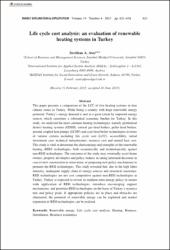| dc.contributor.author | Ateş, Seyithan Ahmet | |
| dc.date.accessioned | 10.07.201910:49:13 | |
| dc.date.accessioned | 2019-07-10T19:52:05Z | |
| dc.date.available | 10.07.201910:49:13 | |
| dc.date.available | 2019-07-10T19:52:05Z | |
| dc.date.issued | 2015 | en_US |
| dc.identifier.citation | Ateş, S.A. (2015). Life cycle cost analysis: An evaluation of renewable heating systems in Turkey. Energy Exploration and Exploitation, 33(4), 621-638. https://dx.doi.org/10.1260/0144-5987.33.4.621 | en_US |
| dc.identifier.issn | 0144-5987 | |
| dc.identifier.uri | https://dx.doi.org/10.1260/0144-5987.33.4.621 | |
| dc.identifier.uri | https://hdl.handle.net/20.500.12511/2340 | |
| dc.description | WOS: 000358995000009 | en_US |
| dc.description.abstract | This paper presents a comparison of the LCC of five heating systems in four climate zones in Turkey. While being a country with huge renewable energy potential, Turkey's energy demand is met to a great extent by imported energy sources which constitute a substantial economic burden for Turkey. In this study, we analyzed the most common heating technologies, namely geothermal district heating systems (GDHS), natural gas-fired boilers, pellet-fired boilers, ground coupled heat pumps (GCHP) and coal-fired boiler technologies in terms of various criteria including life cycle cost (LCC), accessibility, initial investment cost, technical infrastructure, resource cost and annual heat cost. This study is vital to determine the shortcomings and strengths of the renewable heating (REH) technologies, both economically and technologically against non-REH technologies. The outcomes of the study may eventually assist home owners, property developers and policy makers in taking informed decisions in case of new construction or renovation, or proposing new policy mechanisms to promote the REH technologies. This study revealed that, due to the high labor intensity, inadequate supply chain of energy sources and structural constrains; REH technologies are not cost competitive against non-REH technologies in Turkey. Turkey is expected to revisit its medium-term energy policy to ensure wide application of REH technologies, introduce encouraging support mechanisms, and prioritize REH technologies on the basis of Turkey's resource mix and policy goals. If appropriate policies are in place and obstacles are eliminated, the potential of renewable energy can be exploited and market expansion of REH technologies can be realized. | en_US |
| dc.language.iso | eng | en_US |
| dc.publisher | Multi-Science Publishing | en_US |
| dc.rights | info:eu-repo/semantics/openAccess | en_US |
| dc.subject | Renewable Energy | en_US |
| dc.subject | Life Cycle Cost Analysis | en_US |
| dc.subject | Heating | en_US |
| dc.subject | Biomass | en_US |
| dc.subject | Greenhouse | en_US |
| dc.subject | Resource Economics | en_US |
| dc.title | Life cycle cost analysis: An evaluation of renewable heating systems in Turkey | en_US |
| dc.type | article | en_US |
| dc.relation.ispartof | Energy Exploration and Exploitation | en_US |
| dc.department | İstanbul Medipol Üniversitesi, İşletme ve Yönetim Bilimleri Fakültesi, Uluslararası Lojistik Yönetimi Bölümü | en_US |
| dc.identifier.volume | 33 | en_US |
| dc.identifier.issue | 4 | en_US |
| dc.identifier.startpage | 621 | en_US |
| dc.identifier.endpage | 638 | en_US |
| dc.relation.publicationcategory | Makale - Uluslararası Hakemli Dergi - Kurum Öğretim Elemanı | en_US |
| dc.identifier.doi | 10.1260/0144-5987.33.4.621 | en_US |
| dc.identifier.wosquality | Q4 | en_US |
| dc.identifier.scopusquality | Q2 | en_US |


















